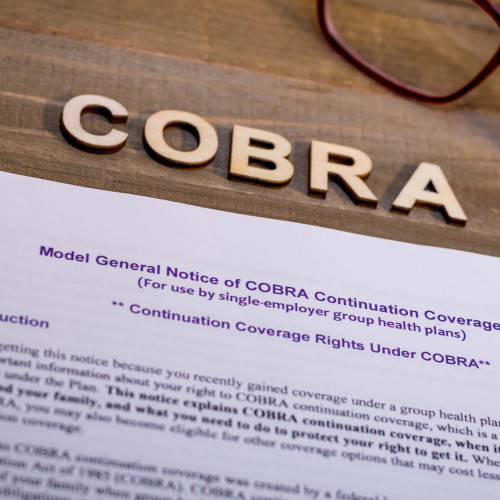Flexible Spending Accounts
A valuable addition to your benefits package
Budgeting for healthcare expenses can be stressful for your employees. But with an employer-sponsored flexible spending account (FSA) from Omnify, you can offer them peace of mind by giving them an option to set aside tax-free dollars to use on healthcare costs throughout the year. In addition to traditional FSAs, we offer accounts for dependent care and limited purpose expenses to round out your benefits package.
Talk to us today about how you can help your employees benefit even more.

COBRA Administration
Let Omnify take the guesswork out of COBRA coverage
Thanks to the Consolidated Omnibus Budget Reconciliation Act (COBRA) of 1985, most companies are required to offer temporary continuation of health coverage to covered employees and their dependents following a termination or reduction in hours. If managing your COBRA benefits has you feeling overwhelmed, we have you covered. Click through to learn more about our COBRA services and how we can help you stay in compliance.


Our team is available to answer questions, solve problems, and help you make the most of your benefits package. Because at Omnify, your benefits have people — real people (like Andrea!) who are there when you need us.
Frequently Asked Questions
The tax treatment of employer HSA contributions depends on how the business is incorporated. For sole proprietors, partnerships, and S-corporations, contributions to a partner’s HSA will be treated as a distribution to the partner and included in the partner’s income and may be deductible by the partner but not by the business (see IRS Notice 2005-8 for treatment of HSA contributions in exchange for guaranteed payments of services rendered for partners and two percent shareholder employees of S-corporations). For larger corporations, employer contributions are treated as employer-provided coverage for medical expenses under an accident or health plan.
Yes. An employer may fully fund the employee’s HSA at the beginning of the year, however HSAs belong to the individual and not the employer and the employer has no further control over the accounts after they have been funded. As a result, many employers elect to fund employee’s HSAs periodically throughout the year.
No. Employers are under no obligation to make any contributions to their employees’ HSAs. Many employers find that contributing to employees’ HSA accounts may help improve adoption of HDHPs and HSAs, especially if they are transitioning from a more traditional type of health coverage.
Employee contributions to an HSA can be made by payroll deductions or personal deposits. When an employee makes contributions through a payroll deduction and is ran through a Section 125 plan (also called a salary reduction or cafeteria plan) these dollar are pre-tax, including social security tax. If employees make personal deposits into their HSA it is on a post tax basis. The amount can be deducted from their taxable income but they will not recover the social security tax.
Yes. High-deductible health plan premiums are much lower than the typical HMO and PPO premiums. Many businesses are finding these health plans affordable for their companies and their employees.
A Health Savings Account (HSA) is a tax-advantaged benefit account that allows you to save and pay for qualified medical expenses.
Unused HSA dollars roll over from year to year, making HSAs a convenient and easy way to save and invest for future medical expenses. Employee’s own their HSA at all times and can take it with them when they change medical plans, change jobs or retire.
Have Questions?
Get help from an expert
|





